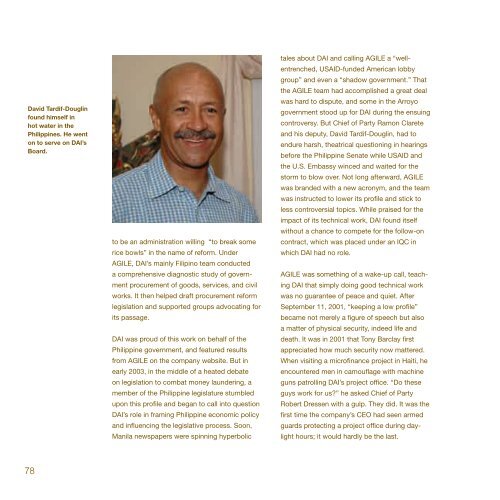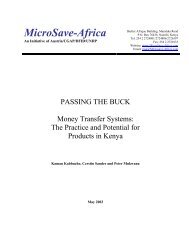Create successful ePaper yourself
Turn your PDF publications into a flip-book with our unique Google optimized e-Paper software.
David Tardif-Douglin<br />
found himself in<br />
hot water in the<br />
Philippines. He went<br />
on to serve on <strong>DAI</strong>’s<br />
Board.<br />
78<br />
to be an administration willing “to break some<br />
rice bowls” in the name <strong>of</strong> reform. Under<br />
AGILE, <strong>DAI</strong>’s mainly Filipino team conducted<br />
a comprehensive diagnostic study <strong>of</strong> government<br />
procurement <strong>of</strong> goods, services, and civil<br />
works. It then helped draft procurement reform<br />
legislation and supported groups advocating for<br />
its passage.<br />
<strong>DAI</strong> was proud <strong>of</strong> this work on behalf <strong>of</strong> the<br />
Philippine government, and featured results<br />
from AGILE on the company website. But in<br />
early 2003, in the middle <strong>of</strong> a heated debate<br />
on legislation to combat money laundering, a<br />
member <strong>of</strong> the Philippine legislature stumbled<br />
upon this pr<strong>of</strong>ile and began to call into question<br />
<strong>DAI</strong>’s role in framing Philippine economic policy<br />
and influencing the legislative process. Soon,<br />
Manila newspapers were spinning hyperbolic<br />
tales about <strong>DAI</strong> and calling AGILE a “wellentrenched,<br />
USAID-funded American lobby<br />
group” and even a “shadow government.” That<br />
the AGILE team had accomplished a great deal<br />
was hard to dispute, and some in the Arroyo<br />
government stood up for <strong>DAI</strong> during the ensuing<br />
controversy. But Chief <strong>of</strong> Party Ramon Clarete<br />
and his deputy, David Tardif-Douglin, had to<br />
endure harsh, theatrical questioning in hearings<br />
before the Philippine Senate while USAID and<br />
the U.S. Embassy winced and waited for the<br />
storm to blow over. Not long afterward, AGILE<br />
was branded with a new acronym, and the team<br />
was instructed to lower its pr<strong>of</strong>ile and stick to<br />
less controversial topics. While praised for the<br />
impact <strong>of</strong> its technical work, <strong>DAI</strong> found itself<br />
without a chance to compete for the follow-on<br />
contract, which was placed under an IQC in<br />
which <strong>DAI</strong> had no role.<br />
AGILE was something <strong>of</strong> a wake-up call, teaching<br />
<strong>DAI</strong> that simply doing good technical work<br />
was no guarantee <strong>of</strong> peace and quiet. After<br />
September 11, 2001, “keeping a low pr<strong>of</strong>ile”<br />
became not merely a figure <strong>of</strong> speech but also<br />
a matter <strong>of</strong> physical security, indeed life and<br />
death. It was in 2001 that Tony Barclay first<br />
appreciated how much security now mattered.<br />
When visiting a micr<strong>of</strong>inance project in Haiti, he<br />
encountered men in camouflage with machine<br />
guns patrolling <strong>DAI</strong>’s project <strong>of</strong>fice. “Do these<br />
guys work for us?” he asked Chief <strong>of</strong> Party<br />
Robert Dressen with a gulp. They did. It was the<br />
first time the company’s CEO had seen armed<br />
guards protecting a project <strong>of</strong>fice during daylight<br />
hours; it would hardly be the last.



